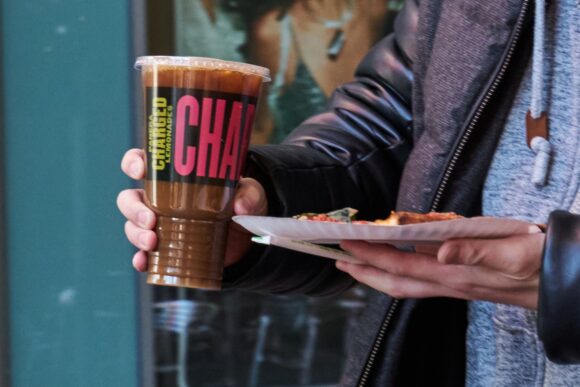Panera Bread Co. must face a lawsuit over a death allegedly linked to its new line of “charged” lemonades, which have thrust the company into the spotlight and brought a renewed focus on the safety of caffeinated energy drinks.
The company this month lost a bid to dismiss a complaint that was filed by the family of Sarah Katz, a 21-year-old University of Pennsylvania student, who sued the company after she died of cardiac arrest in September 2022. Another suit was filed last month in relation to the death of a 46-year-old Florida man who had a heart attack after consuming the beverage in October.
Panera introduced Charged Lemonade in April 2022 to capture a slice of the $21 billion energy drink market, which grew by about 8.6% last year, according to Beverage Digest. The amount of caffeine in the drinks has been the subject of numerous social media posts since they were introduced last year.
While a multitude of energy drinks are available, a lawyer for the Katz family says the problem at Panera is worse than for other products because the company promotes plans that allow unlimited refills and serves the beverages alongside other non-caffeinated drinks, leading consumers to believe they are safe.
“It’s not really a lemonade at all,” said Elizabeth Crawford, a Philadelphia-based lawyer for the plaintiffs in both suits. “It’s a toxic energy drink. It’s got 390 milligrams of caffeine, which is a lot of caffeine for a product that is going to be advertised with unlimited refills when the FDA recommends less than 400 milligrams a day.”
Undiluted, Charged Lemonade has 13 milligrams of caffeine per ounce, about the same as Panera’s dark roast coffee. A large lemonade contains 30 ounces of the drink, which is sold in flavors such as Strawberry Lemon Mint and Mango Yuzu Citrus.
Crawford said US District Judge Timothy J. Savage in Philadelphia rejected the company’s arguments in the October lawsuit that there was no causal relationship between Katz’s death and the lemonade. Panera had said in their filings that Katz had a life-threatening heart condition called Long QT Syndrome since age 5 that put her at “increased risk of sudden cardiac arrest and death.”
Panera didn’t immediately respond to email inquiries seeking comment on the decision. After the second suit was filed last month, the company expressed “deep sympathy” for the family while standing by the safety of its beverages.

Last month, St. Louis-based Panera Bread cut 17% of its corporate workers as its parent company, Panera Brands, prepares for an initial public offering. The company, controlled by JAB Holding Co., also includes Einstein Bros. Bagels and Caribou Coffee.
This isn’t the first time that energy drinks have been the focal point of litigation.
More than a decade ago Monster Beverage Corp. and other drink makers faced a flurry of lawsuits and inquiries from regulators over the caffeine content of its products following the death of a 14-year-old Maryland girl after consuming its signature product in 2011. A 16-ounce can of Monster has 160 milligrams of caffeine, or about 10 milligrams an ounce.
A California jury in 2018 found in favor of Monster in one lawsuit alleging its drinks caused cardiac arrest in the first case of its type to go trial, a decision that was upheld in 2021.
Monster settled the initial case involving the girl from Maryland, but said that there is no medical, scientific or factual evidence to support the finding that “caffeine toxicity” caused the teen’s death, and later settled the case before trial.
The company changed the way it marketed its signature drink to label it as a beverage, rather than a dietary supplement, and added a disclosure about the amount of caffeine to its cans.
Panera has also added warnings in the wake of the lawsuits, informing consumers that the beverages include caffeine, should be used in moderation and are not recommended for children, people sensitive to caffeine, pregnant or nursing, and also moved the product behind the counters, Crawford said.
Another lawyer who represents consumers in lawsuits against companies said that the Panera litigation is different from the previous round of caffeine cases.
“The legal theories are similar, but the facts may be even more favorable for plaintiffs,” said Omar Ochoa, a Texas lawyer who isn’t involved in the cases filed by Crawford. “Panera’s Charged Lemonade reportedly has more caffeine in the large size than a 12-ounce can of Red Bull or an 18-ounce can of Monster. This elevated level provides even more reason to believe there’s a duty to warn consumers of risks.”
In addition to the Katzes, Crawford represents the family of another person who died after taking the product. Dennis Brown allegedly suffered a heart attack in 2023 after drinking three servings of the lemonade. Brown suffered from a chromosomal deficiency and an intellectual disability.
“Based on our investigation, we believe his unfortunate passing was not caused by one of the company’s products,” Panera said in a statement.
Elizabeth Burch, a law professor at the University of Georgia, said the health problems of Brown and Katz, however, indicate that the number of lawsuits might be limited.
“These are such extreme cases,” said Elizabeth Burch, a law professor at the University of Georgia. “In order to open up floodgates I would think you would have to have a broader theory of liability that would lend itself to more of a class action type scenario. I don’t think we’ve seen that.”
Top photo: A customer carries a Charged Lemonade from Panera. (Bing Guan/Bloomberg)
**Article obtained from: Insurance Journal, By: By Chris Dolmetsch, Bloomberg, Published 12/28/2023
https://www.insurancejournal.com/news/southeast/2023/12/28/753335.htm
Copyright 2023 Bloomberg.






